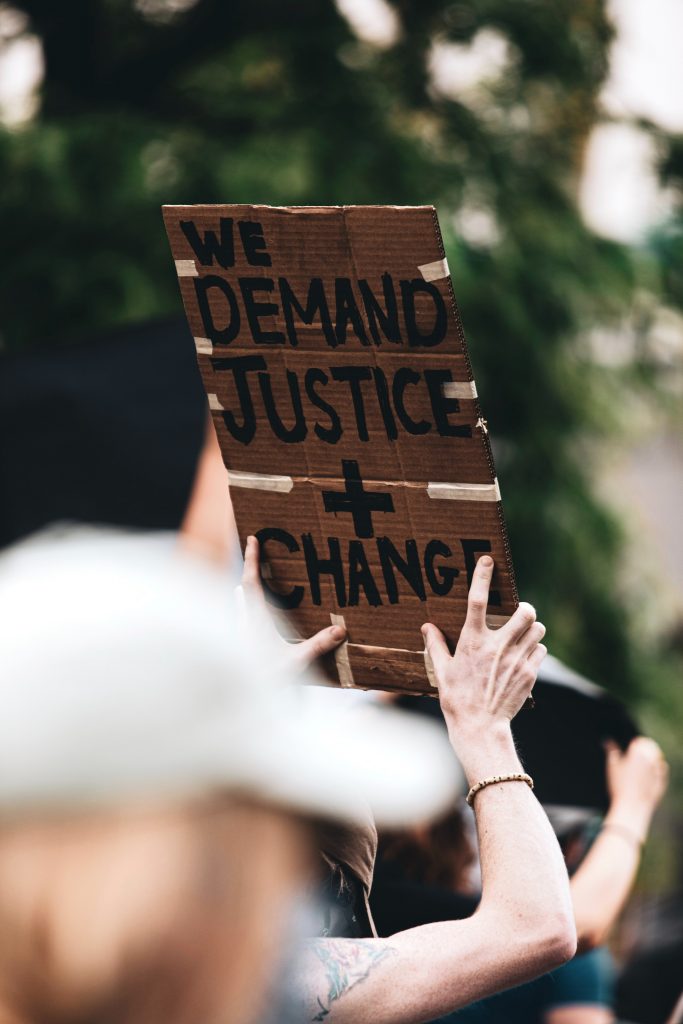Father Chet, June 15, 1971
Editor’s Note: It is remarkable to consider that Father Chet wrote the following words 50 years ago. We marvel at his prescience to 2021 as we grapple with communication, respect for diverse points of view and experiences, and strive to heal divisions.
We offer his message knowing that it also presents a challenge in its length for a newsletter; it is advised, and thus popular, to keep messages short, bite-sized, that we can take in on the go. Make time to read this, to consider, and to pray over his admonitions to love so that another 50 years does not elapse without seeing change.
Why are we urged by the church to become involved in the elimination of poverty, war, and racism? Is it not just as true now as ever that religion and politics don’t mix? Are not the church and its clergy out of their element when they concern themselves with changes in the structure of our society? What right do priests and ministers have to criticize our government and its leaders in their conduct of the wars that we are involved in, or such matters as the missile race, and foreign aid to Asia, Africa, and South America? Are not economic and political affairs outside the purview of the church? Should not decisions in these matters be left to the experts in these fields? Should not the old tradition of the separation of church and state be maintained? Should not the church confine itself to personal and individual morality and leave the conduct of political affairs and larger economic and social matters to politicians and other professionals?
Social Development
The answer to the above questions is emphatically, “No, no, no!” The function of religion, the church, and the clergy is to help us make moral judgments about all things: political, economic, governmental, poverty, race, war and peace. Religion is not only a matter of individual morality. The conduct of government and all the other social institutions of our day can very easily become evil and destructive of individuals and society as a whole.
Continuing the gospel of Christ, the mission of the Christian church is to sit in judgment on the actions of our governmental leaders, the actions of the governments of other countries, the conduct of the United Nations, our vast military-industrial complex, our giant corporations, as well as other large and small institutions. Ultimately the supreme court of appeal for every one of our decisions is our personal conscience.
give us the strength and courage to carry out our commitments to truth, justice, freedom, love, and peace
But in our complex society, the individual needs help from others to arrive at a proper conclusion. Whether or not we realize it, the people who help us to form our judgments about right or wrong are performing a religious function. This is what religion is all about – to make judgments concerning morality and immorality and then to give us the strength and courage to carry out our commitments to truth, justice, freedom, love, and peace.
Socialization of Humankind
Not too many generations ago, individuals were so scattered over the face of the earth that the majority of moral decisions involved one individual toward another, one family toward another, a small group toward other small groups. Within the lifetime of many of us, the population of the world has tripled. For all practical purposes, the territory of the earth has reached its saturation point. From now on, humanity’s main task on earth is the problem of human unification, collectivization, totalization, socialization – or, if you wish, SOCIAL DEVELOPMENT.

In the words of Pierre Teilhard de Chardin, SJ, “No one can deny that [humanity], after having gradually covered the earth with a loosely socialized living fabric, is now coming to knit itself together racially, economically, and mentally at a rapidly increasing speed. The world of [humankind] is being irresistibly driven to form one single unit.”
Just as individual human beings, at the beginning of their appearance upon earth, learned to reflect upon themselves, so now all of humanity must learn to reflect and converge upon itself. There was a time in the not-too-distant past when individual development was of greater, or at least of equal importance, as the development of society. Today, it is apparent that, for our survival upon earth, collective or “social” development must be our predominant interest. In this increasingly complex and compressed society, we must learn to live together in peace and harmony, loving one another and sharing our store of goods. From now throughout the future, individuals, societies, churches, and governments must have as their primary pursuit the elimination of social evils.
Universal Love
One of the great contributions of Theilhard de Chardin is his scientific study of the convergence of humankind upon itself. This concentration and organization of humanity into one unity is irreversible and impossible to stop. The question to decide today is what kind of unity does humanity want? Theilhard insists that the only viable and even possible bond to unite all of humankind is love. He writes,
Love is the most universal, formidable, and mysterious of cosmic energies. The passionate concern for our common destiny draws the thinking part of life ever further onward. This feeling of universal love can become explicit only when our consciousness has expanded beyond the broadening circles of family, country, and race, and has finally discovered that the only true, natural and human unity is in the spirit of the whole earth.
The Social Mission of Christ and the Church
Last century, Pope Leo the XIII recognized the church’s responsibility to speak openly and fearlessly concerning social injustices. With the publication of his encyclical, Rarem Novarum in 1891, there began a real persecution of this pope as well as the bishops and priests who followed his lead in speaking publicly and boldly against the abuses in labor, industry, and politics. Many Catholics labeled Pope Leo a socialist and a communist, insisting that he had no right to address himself to the problems of politics and economics.
If any religious body is to survive as a meaningful institution, it must address itself to political, economic, and social issues. Jesus came to save all humankind; not only individuals, but also society as a whole. He constantly spoke of the universal kingdom of love which he came to establish upon earth. Love of one another, and especially love of the poor, were to be the hallmarks of every member of this kingdom. Justice and truth, as well as mercy and love, were to penetrate every relationship on earth.
True Unity
He assured us that one day true unity would be established on earth, achieved not by external violence or force or fear, but through the spirit of love. Whoever wishes to share in the spirit of love must die to the old person of selfishness and be born again into the new human of love of God and others.

Despite Jesus’ dire warnings concerning the evils in the world, our Lord was an eternal optimist. He insisted that right here upon this earth mankind will one day experienced a marvelous unity and love. Jesus Christ was much more of a moralist than a dogmatist. Since morality is the science which determines the rightness or wrongness of every human action, it is not belaboring the obvious when we insist that Christ and his church have much to say about the social issues of poverty racism, war, peace, and aid to developing nations.
Christ and Poverty
From the very beginning of his public life, Jesus ministered to the needs of the poor, the hungry, the sick, the suffering, and the outcasts of society in his day. He was constantly criticized by leaders in the upper classes for his frequent association with the despised publicans and public sinners of his time.
When he sent his apostles out on their first missionary journey, he directed them to go to help all who were in need. It was not merely a matter of urging the downtrodden to put up with their pitiful conditions and look forward to a better life after death. The happiness of eternal life was to begin immediately and result from the willingness of the haves to share with the have-nots so that everyone would have a sufficiency. For example, the rich young man asked Jesus what more he should do than merely obey the ten Commandments. Jesus replied, “Go, sell all you have and give to the poor, then come follow me” (Mark 10:21).
Christ and Race
The major racial problem with which Jesus had to deal was the tension that existed between the Jewish people and the Samaritans. In the eyes of the good Jews of that era, it was considered proper to despise the Samaritans who lived in their midst. Jesus would have no part of such racial prejudice; he made a special point of associating with the Samaritans. For example, on his way back to Galilee after his baptism and sojourn in the desert, Jesus not only conversed with the Samaritan woman at the well of Jacob but also stayed two days in the Samaritan town of Sichem making many disciples.
On another occasion, when the militant Samaritans refused to let Jesus and his apostles pass through their town, John and James wanted to call down fire from heaven to destroy the town. Instead, Jesus gave them a stern rebuke and a much-needed lesson in nonviolence. On still another occasion, when asked by a Pharisee, “Who is my neighbor?” Jesus replied by telling the story of the Good Samaritan, thereby forcing him to admit that even the Samaritan could be a better neighbor than the priest or the Levite (Luke 10:29-37).
Christ and Nonviolence
From the beginning of his public ministry, Jesus preached nonviolence. In the Sermon on the Mount, he counseled his disciples to turn the other cheek, to return good for evil, to love their enemies, and to do good to those who hated them. When sending his apostles on their missionary journeys, he counseled them not to use violence, even if they met opposition and persecution. They were simply to shake the dust of that place from their feet and peacefully depart to where they would be better received.
The attitude of Jesus toward the Jewish people and the Romans after his arrest was one of absolute nonviolence. When the Apostles in the garden of Gethsemane started to use the sword to defend Jesus from unjust arrest, he commanded them, “Put your sword into your scabbard. Those who draw the sword will perish but the sword” (Matt. 26:52).
Knowing human nature, Jesus knew that human beings had and would continue to see war as a means to right injustices and protect their interests. Therefore, he predicted that there would be wars and rumors of wars. However, this in no way means that Jesus approved of war, violence, or killing. Rather, Jesus practiced and preached the opposite.
Conflict, Not Force

Because his kingdom was a kingdom of love, and because he respected the freedom of every individual, Jesus refused to make use of force to accomplish his goals. This attitude was opposed to the prevailing Jewish political attitude. Most of the Jewish people bitterly resented the Roman army of occupation. They were ready to go to war, to use the sword, to use any type of violence and killing to drive the foreigners from their land. Jesus refused to be a part of this violence.
However, in no way does the absence of violence mean the absence of conflict in the life of Jesus. Almost from the very beginning, Jesus was embroiled in confrontations with the religious authorities. He constantly challenged those in high office for their failure to live up to and carry out the religious mission entrusted to them by the Law of Moses. Again and again, Jesus confronted the religious leaders for their failures. “Woe to you, Scribes and Pharisees, you hypocrites. You lock the kingdom of heaven against human beings” (Matt. 23:13).
Today’s Christian and Poverty
While, many are keenly aware of their responsibilities toward the poor of their own community, as far as the poor of the rest of the world are concerned, “out of sight out of mind” is the axiom which can certainly be applied to most of us. There are comparatively few who realize that the obligation to be our neighbor’s keeper extends to the farthest reaches of the earth. As long as we have no direct contact with the destitute either in our own country or in other countries, we find that we usually have a very convenient memory which has no room for more than our own personal and family problems.
We usually have a very convenient memory which has no room for more than our own personal and family problems.
We can usually rationalize ourselves into believing that the welfare programs of the government are sufficient and that many of those on relief are able-bodied persons who could find work if they really wanted a job. Since we are not in India or in other countries where you could see people starving to death on the streets, we lull our consciences to sleep with the conviction that the needs of the poor are already being covered. We further rationalize that, perhaps when we are older or have more time, we will investigate and see if there is something we can do.
A close reading of chapter 25 of St. Matthew’s Gospel should convince us that helping the poor is something that cannot wait or be put off. If we want to be Christians, it is our responsibility to discover, here and now, what should be done to ensure that every human being on earth has access to a minimum standard of decent living.
Broadening Our Definition of “Poor”
When we think of the poor we should not limit our thoughts to the materially poor. There are the poor in spirit, those who are the outcasts of society: those addicted to drugs and alcohol, the mentally challenged, the emotionally disturbed, the prisoners in our jails. People need people; and at present not enough of us are willing to minister to others. The sadness of the story is that there are many people who have time on their hands and are bored with the uselessness of their present lives. Yet, for one reason or another, we demure about helping others.
We can help impoverished families, troubled teenagers, and other isolated individuals. We can visit hospitals and nursing homes. But besides individual aid, we must stimulate and join with others to tackle the larger social problems of poverty that are beyond the realm and imagination of one individual. This is where social development committees, or other designated groups of concerned individuals, are so necessary in the parish and in the community.
Today’s Christian and Racism
There are many facets to racism. The odds are the most of us are, in one way or another, some kind of racist. At that comment we are taken aback and quickly challenge it mentally. But what do we mean by a racist? A racist is anyone who habitually, and often unconsciously, imagines that most people of another race, group, or community are inferior—or less important—to the members of their own race, group, or community. This inferiority may be in the areas of intelligence, morality, application to one’s job, etc.
The basic evil of racism is that it is the sin of rash judgment, i.e., making a wholesale judgment of an entire group of people. Most racists are willing to allow exceptions to the general rule, thereby glossing over our true and innermost attitudes.
Change Racial Mores
Besides trying to treat each person we meet – regardless of race, national origin, or religion – with dignity and respect, we must do more to change the racial mores of our society. The problem is so deep-seated and long-standing that not only are most of us infected with this dread social disease, but many of our national and local institutions are also vitiated with unconscious or conscious racist attitudes.
As Christians, we should be in the vanguard of leadership
The problem of segregation in housing and job opportunities, for example, is one that requires the combined efforts of large groups of Americans. As Christians we should be in the vanguard of leadership to rectify the many injustices which are still foisted upon Blacks, Latinos, Asians, and Native Americans and any other minority.
Today’s Christian and the Problem of War
A study of the Sermon on the Mount would make clear that any Christian who embraces the solution of war and violence does not follow the leadership of Christ. We must indeed concern ourselves with the struggle to see that justice is done to all and that the rights of all are respected; but this should always be accomplished in a nonviolent way. Non-violence is based on the belief that humankind and human nature are basically good, not evil, and that it is possible to appeal to these good instincts of a nation and a people, thereby preventing a dictator or a selfish group with invested interests from leading a whole nation into war.
The task of Christians is to use moral persuasion to awaken others to their social responsibilities to the people of the world. We must identify so completely with the poor, the weak, the outcasts, and the forgotten ones that, when they are treated unjustly, we also will experience the same hurt. After the manner used by Gandhi of India, we must be ready and willing to resist all serious offenses against justice, even to the extent of endangering or losing our lives for the cause of justice. This does not mean returning evil for evil, but rather, openly and publicly broadcasting the injustices being perpetrated against our fellow human beings.
Challenge of Prophetic Protest
Public resistance to evil will almost certainly result in open persecution. No doubt, some of the apostles of nonviolence will die for their efforts. Our life, our words, but especially our actions, should be constant prophetic protests against the forces in our society, and, if necessary, against the powers of our government or other governments when they ignore the rights and needs of the socially invisible members of the human race.

Let no one imagine that such prophetic protest will be easy. Neither individuals, institutions, communities, nor nations easily forgo a situation which is profitable to them. Through rationalization and long-standing acceptance, it is comparatively easy for most of us to lull our consciences to sleep whenever a condition redounds to our own advantage.
Challenge the Accepted
Brainwashing is not a new phenomenon. If something is repeated often enough by many people over a long enough period of time and is not challenged, we are willing to accept the most patent untruths and injustices. Once a reversal of opinion occurs, we are amazed that we accepted a former situation or statement without questioning. The prime example of this is the fact that Christians, beginning with St. Paul, accepted the enslavement of other human beings for 1900 years before it became apparent that slavery was unjust.
Nearly all of us have accepted without question that war is a justified means for a nation to protect its interests or to protect the interest of some allied nation. For the greater part of our lives, nearly all of us have accepted as just and proper that our government should draft our young men and send them off to kill and wreak violence not only on enemy soldiers, but also on the entire civilian populations of an enemy nation.
But now, it is being suggested to us by persons whose judgment we value that we should ban all war, all killing, all violence; that we should be doves and not hawks; that we should stop adding to our nuclear stockpile of weapons; that the time has come in the evolution of the human race to ban war just as we banned slavery.
The Will to Change
Such a reversal of attitude by nations and individuals will not happen overnight, and will not be easy. There are many unresolved questions. How far, for instance, should we go in protecting our country and our loved ones, and ourselves against the attack of a manifestly unjust aggressor?
If we become convinced that for humankind the age of warfare and violence must end, then we will set our creative imaginations to discover the methods to accomplish this goal. If our nation and other peace-loving nations work together, a lasting end to war, poverty, and racism can be accomplished in our lifetimes. We lack only the will; once we have this, the goal can be accomplished.
Consider that Father Chet wrote this newsletter two days following publication of the first article detailing the Pentagon Papers in the New York Times on June 13, 1971.
